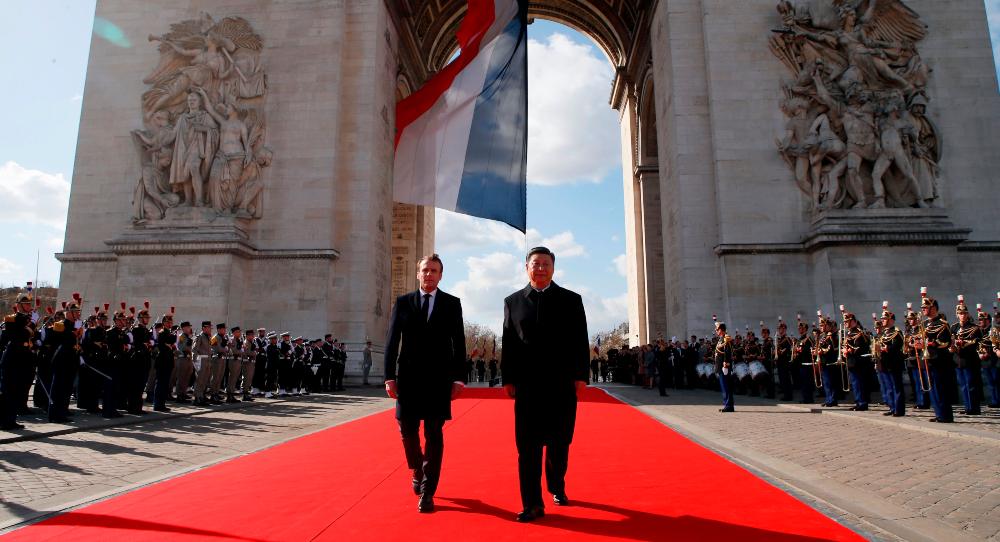So much for a common EU policy and strategy toward China.
Off goes French President Emmanuel Macron to Beijing on November 4, just two months after Angela Merkel made her twelfth visit to the country since becoming German chancellor back in 2005.
There had been hopes about a future joint visit by the French and German leaders. That would have sent a strong signal to Beijing about the common stance of the EU’s biggest economies toward China. Such hopes have come to naught.
Instead, the two successive visits are a far cry from the quasi-unanimity that presided over the announcement of a new EU China strategy in March 2019 (which referred to China as a “systemic rival”), following an unprecedented meeting hosted by Macron in Paris, where he invited Merkel and European Commission President Jean-Claude Juncker to join his talks with Chinese President Xi Jinping.Berlin and Paris appeared to be on the same page on China, but, since then, they have ploughed their own separate paths. When it comes to China, national interests still prevail.
Take France. As a guest of honor of the China International Import Expo in Shanghai, Macron will be joined by French meat exporters, bankers, and aerospace executives and do his best to bring back domestic benefits from his China visit. But he will also try to score personal points on multilateralism, climate, and culture—the latter with the long-awaited opening of the Pompidou Centre in Shanghai.
As for Germany, Merkel’s visit in September was accompanied by a delegation of senior businesspeople such as the CEOs of Siemens and Volkswagen—two large German investors and exporters to China. She carefully avoided raising (at least publicly) the EU’s list of grievances, which includes risks in technology transfers, market access, or the role of Chinese state subsidies. These are precisely the issues that the Federation of German Industries want to have a discussion about.
At the end of the day, Merkel’s main interest is to protect German business interests in China. After all, Germany’s trade deficit with China (€13 billion in 2018) is the smallest among the large European economies, meaning the German economy relies heavily on its exports.
Macron’s main interest is different, because France’s situation is different.
With a €29 billion trade deficit, its economy is not as dependent as Germany’s on exports to China. Many French defense-related high-tech industries remain bound by the 1989 arms embargo, and, because of the difficult operating circumstances on the Chinese market, several French industrial groups, including Alstom, Auchan, and Carrefour, have left China or vastly reduced their business presence there over the past years.
Macron is a highly ambitious, risk-taking president at the peak of his term. He is keen to be pictured in an international leadership role. Unlike Merkel, who is reaching the final years of her political career, Macron intends to run again at the presidential election in 2022. And as in his first presidential campaign, the European agenda will be central, including relations with China.
Indeed, Macron played a key role in drafting the EU’s new China strategy and delivered a powerful speech in the city of Xian during his 2018 visit, insisting that market access to Europe through the Belt and Road Initiative “cannot be one-way.” This also means Macron’s visit is not all Sino-French-centric. There will be a European element.
But like Merkel, Macron will be visiting China as his country’s top leader rather than as a key EU representative. He will promote French interests, whether in the economic or diplomatic spheres. Opposing U.S. President Donald Trump’s unilateralism, France and China will publicly promote multilateralism, including the United Nations, the World Trade Organization, and the Paris climate agreement.
France and China are permanent members of the UN Security Council, which is currently chaired by non-permanent member Germany. It should have been a good opportunity for the two European nations to work together on behalf of the EU, for example on a long-term economic partnership with China, but, so far, France and Germany are not fully aligned on their objectives.
Even progress on the EU’s Comprehensive Agreement on Investment with China, which is to be completed in 2020, has been slow. On this topic, which is in the interest of both their economies and the EU’s in general, Macron and Merkel are not singing the same tune.
And then there’s the controversial issue of allowing Chinese telecoms companies Huawei and ZTE to bid for the next-generation 5G networks. While Paris remains silent on the topic, it appears Berlin is about to allow Huawei to take part in the 5G competition in Germany.
Even with the recent publication of a thoughtful EU coordinated risk assessment of 5G networks security, the EU’s two main powers do not see eye-to-eye on this issue either.
The final year of the Juncker commission showed a European shift in dealing with China. But the incoming commission under President-elect Ursula von der Leyen, Merkel’s former defense minister, will have to be hard-nosed if she wants a coherent EU policy toward China.
That means convincing Berlin and Paris that a united stance is necessary if Europe is to exert any meaningful political and economic influence in its relations with Beijing.
Merkel might become amenable; she will have her China moment in September 2020, when she hosts a new type of EU-China summit in Leipzig, which will be attended by all twenty-seven EU member states and Xi Jinping.
Berlin and Paris could well use the intervening months to decide if they really do want a common, European policy toward China.






